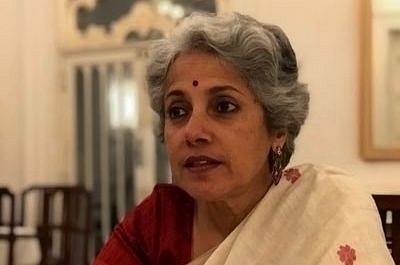News Brief
Chief Scientist Soumya Swaminathan Says Delta Plus Isn't Currently A 'Variant Of Concern' For WHO
- Delta variant is labelled as a "variant of concern" by the United Nations health organization but not its mutated version-Delta Plus, says WHO Chief Scientist Dr Soumya Swaminathan.

WHO Chief Scientist Dr Soumya Swaminathan
The World Health Organization (WHO), which has been monitoring the coronavirus pandemic situation since the early months, does not consider the Delta Plus variant to be a "variant of concern" because infection rates are still modest, said the global health body's Chief Scientist Dr Soumya Swaminathan.
The WHO expert told NDTV that the Delta variant, which first detected in India, is labelled as a "variant of concern" by the UN health organization but not its mutated version—Delta Plus. Swaminathan said that at this moment, there is no reason to believe that the Delta Plus variant is a new variant of concern that "we panic about". Additionally, she explained that "I think it is important that we don't panic over every new mutation. This is an expected evolution of the virus."
Many experts believe that as long as the SARS-CoV-2 continues to circulate around the world, new variants will emerge. For example, according to top officials, in the last year, Indian genetic diagnostic institutes have discovered over 24,000 mutations in the novel coronavirus. In a February 2021 report, they said that around 7,000 versions of the novel virus in circulation in the country had been found to have mutations. At that time, Sujeet Kumar Singh, Director of the National Centre for Disease Control (NCDC) said: "More than 2 lakh mutations in the virus have been recorded globally. But did all the mutations incite a rise in cases? The mutations are a natural process of evolution in a pathogen. It is relevant only if it induces a change in the trend of disease spread".
The fact that the Delta Plus variant, also known as B.1.617.2.1 or AY.1, is resistant to the monoclonal antibody cocktail is the most notable aspect emerging regarding this version of the virus. But since this variant is still being studied by the researchers, it is currently not clear whether this could breach the vaccine triggered protection. As of now, including India, the Delta Plus variant has been found in nine countries, such as the United States, the United Kingdom, Portugal, Switzerland, Japan, Poland, Nepal, China and Russia. As per reports, Indian authorities has recorded at least 22 cases of the Delta Plus variant, which the government has classified as a "variant of concern" recently.
However, Chief Scientist Swaminathan claimed that there was "no logic" behind countries excluding Covishield—the Indian version of Oxford-AstraZeneca jab—from their vaccine passport program, which will make travel easier during the pandemic. "This was done mostly on a technicality since the AstraZeneca vaccine is available under a different brand in Europe," she added. The WHO expert also stated that the UN health body was in discussions with the European medical regulator about including Covishield in vaccine passports.
In the case of WHO's approval of the made-in-India vaccine Covaxin, Swaminathan predicted that the global health organization would take a decision about Bharat Biotech's jab by the second week of August. Covaxin, which was approved by the Indian Drug Controller in January this year, has been awaiting emergency use authorization from WHO.
Introducing ElectionsHQ + 50 Ground Reports Project
The 2024 elections might seem easy to guess, but there are some important questions that shouldn't be missed.
Do freebies still sway voters? Do people prioritise infrastructure when voting? How will Punjab vote?
The answers to these questions provide great insights into where we, as a country, are headed in the years to come.
Swarajya is starting a project with an aim to do 50 solid ground stories and a smart commentary service on WhatsApp, a one-of-a-kind. We'd love your support during this election season.
Click below to contribute.
Latest